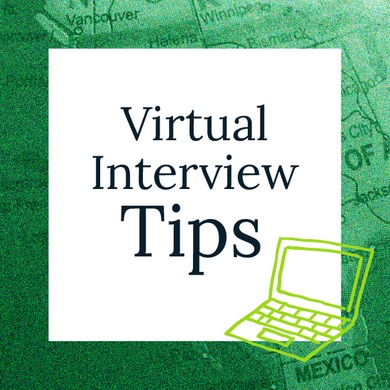So, Like, You Probably Don't Want to Use Filler Words in an Interview

Like, uh, uhhhmm, ah, eh, hm. So, uh, I was thinking, like, how can you, uh, stop relying on these uh conversational bridges?
While these phrases are important in everyday conversation, they can make you look underprepared in a job interview or when networking at a job fair. Scholars are still debating whether or not they lend a positive or negative effect to the speaker, but one study found that the more filler words telemarketers used, the less likely they were to convince people to take a survey.
The perception of competence could be the difference between landing a job or getting ghosted by a company. And that's unfair. These words are especially significant if you're a non-native English speaker since they can act as a buffer when translating your thoughts from your first language to English.
Although this article can’t dismantle people's limited perception of intelligence by measuring the use of filler words, it can help you navigate the realities of being in a professional environment.
So, how can you reduce their use?
Find peace in the pause
If words are the colors in your painting, pauses are the negative space that allows your composition to breathe.
It may feel unnatural at first to take a two- or three-second long pause when you're telling a story. This silence may feel like it goes on forever, and throwing a filler word helps bridge the gap between two ideas.
1. Pauses allow you to build suspense
Just because you aren't talking does not mean the person you're speaking to isn't listening. Pausing allows the listener to absorb and analyze the ideas that you presented, giving them time to care about what you just said.
2. You can be intentional with your words
Your pauses allow you to be more precise with your word economy. Why use 20 words to convey an idea when nine would be more impactful?
3. You can keep yourself calm
Just breathe. Taking a breath helps center you and get your ideas back on track.
Slow down
This might be difficult to do. According to the University of Missouri, we think at 400 words per minute but can only speak at 125.
When our fight or flight is activated, every second can feel like 10. If you feel intimidated by who you're talking to, remember this: that person has probably spilled ranch on their shirt, tripped walking up the steps, and called someone by the wrong name. They are not better than you, and your thoughts deserve to be heard.
Listen to your speech patterns
Recording yourself can give an objective look at how you speak and where you overly rely on filler words. Recording yourself can also help you identify where you can insert pauses in your speech, breaking up your ideas.
It may feel uncomfortable at first to hear your voice and its cadence, but be a friend to yourself and be objective about your speech patterns without being overly critical.
Tell a friend about your breakup with filler words
A good friend typically likes hearing what you have to say.
They also pay close attention to how you say it. Having a friend join you on your filler word journey gives you someone to kindly hold you accountable when you’re using filler words as a crutch.

Tips for a Successful Virtual Interview
Learn from the best
If there is a teacher or peer whose public speaking skills you admire, ask them what tools they use to communicate effectively.
Or, maybe you admire an influencer on TikTok, a thought leader, a standup comedian, or another public figure whose job is to speak publicly. Watch their content to see what rhetorical or structural devices they rely on to help them avoid unintentional filler words.
Remember this is a process
Give yourself the time and space to edit some of your speech patterns. Almost everyone in every language uses filler words when speaking, so don't get discouraged when they don't leave your speech patterns quickly. You are undertaking a huge rewire to succeed at interviewing and networking, which is commendable.
Resources
At Teach For America, we help young leaders like yourself deepen their interview and career readiness skills as they prepare to join our teaching corps. An important part of doing well in the interview process is to reflect on what's important to you personally as well as the organization where you're interviewing. Explore the questions that we suggest Teach For America applicants review when preparing for their final interview.



